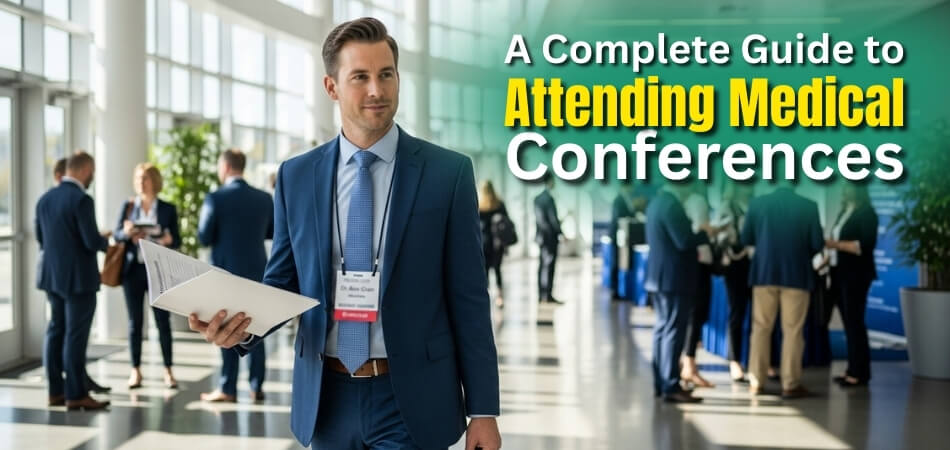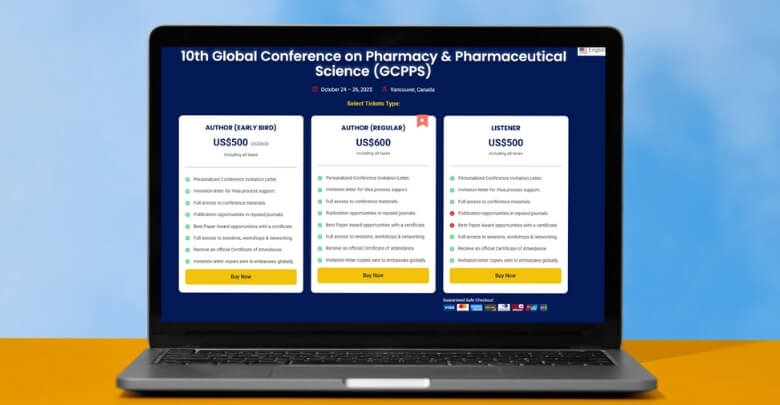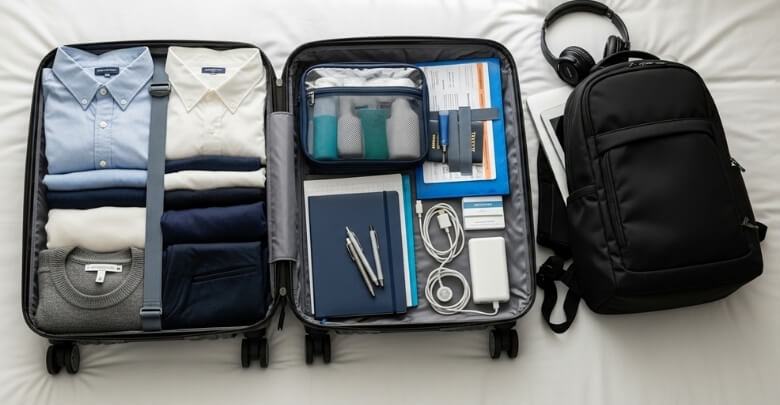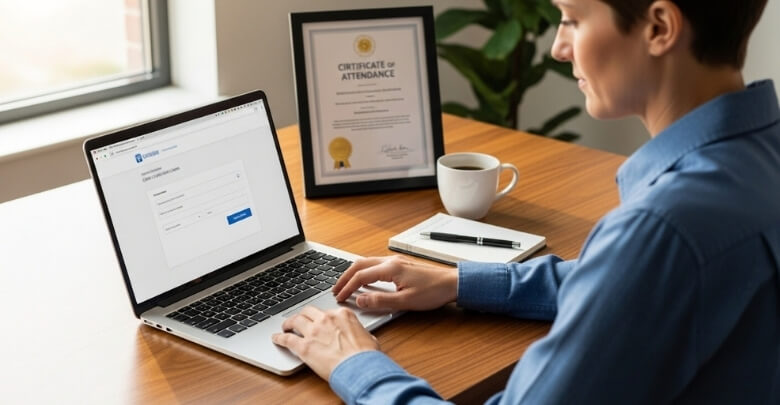Medical conferences are a great way to learn, grow, and meet new people in your field. They give you the chance to hear from experts, discover new ideas, and connect with others who share your interests. These events can feel big and busy, but with the right approach, they become exciting and valuable.
This is why we’ve put together a complete guide to attending medical conferences.
To attend a medical conference, plan early and set clear goals. Choose sessions that match your interests. Bring notebooks, business cards, and use the event app. Take notes, ask questions, and meet new people. After the event, organize your notes, stay in touch with contacts, and share what you learned with others.
Keep reading for the full guide.
A Complete Guide to Attending Medical Conferences
Attending medical conferences is a great way to learn, connect, and grow in your career. With the right preparation, you can make the most of every session and interaction. This complete guide to attending medical conferences will help you plan, stay organized, and gain lasting value from the experience.
Preparation Before the Conference
To really enjoy and learn from them, being prepared makes a big difference. These few smart steps before the conference can help you feel confident and ready.
Check the Program
Start by going through the conference schedule carefully. Look for workshops, sessions, and talks that match your interests. Highlight the topics and speakers you don’t want to miss. This way, you’ll avoid confusion and make the most of your time.
Set Your Goals
Before you go, think about what you want to achieve. Maybe you’re aiming to earn credits, learn about new research, or meet professionals in your field. Having clear goals keeps you focused during the event. It also makes your experience feel more useful.
Register Early
Don’t wait until the last moment to sign up. Many popular workshops and meet-ups fill up quickly. By registering early, you secure your spot and avoid stress. Early registration can also sometimes save you money on fees.
Use the App
If the conference has a mobile app, download it right away. These apps usually give you real-time updates and let you build a personal schedule. Some even help you connect with other attendees. This makes it easier to plan and stay organized.
Plan Your Travel
Do some research about the venue and location before the event. Book your travel tickets and hotel early so you don’t face last-minute problems. Make sure you plan your budget for food, travel, and stay. Being ready with all details makes the trip smoother.
Bring Essentials
Pack smart and carry things that will help you during the sessions. A notebook, business cards, or even a tablet for taking notes can be useful. Having these items makes learning easier and helps you connect with people. Little things like this can make a big difference.
Many countries, like the United States, Canada, and Germany, are famous for hosting large medical conferences. For example, conferences in Vancouver are well known for their engaging sessions and great networking opportunities. No matter where the event takes place, careful preparation will always help you succeed.
Activities and Behavior During the Conference
There are sessions, talks, exhibits, and people everywhere, making each moment full of possibilities. To enjoy and learn more, how you act really matters. Small choices during the event can create a big impact later.
Follow Your Schedule
Having a plan is helpful, but try not to make it too strict. Stick to your schedule for the important talks you really want to attend. At the same time, stay open to new sessions that pop up. Sometimes, unplanned moments turn out to be the most useful.
Join the Sessions
Don’t just sit quietly during the sessions—get involved. Write down notes that you’ll understand later. If you have questions, ask them politely and clearly. Talking to speakers and other attendees will make your learning stronger and more memorable.
Explore the Exhibit Hall
The exhibit hall is worth your time because it’s full of new ideas and opportunities. Companies often show the latest tools, research, or technology there. Walking around and speaking with representatives can give you career advice or future study options. It’s like a big learning market.
Focus on Networking
Meeting new people is one of the biggest benefits of a conference. Practice a short introduction about yourself so others know who you are and what you do. Don’t be shy to talk with fellow attendees, speakers, or recruiters. These connections can be valuable later.
Use Social Media
Social media is a great way to share and connect during the conference. Platforms like X (formerly Twitter) and LinkedIn help you reach a larger group of people. Use the event hashtags to join online discussions. It’s an easy way to grow your professional circle.
Take Breaks
Conferences can get tiring if you don’t take care of yourself. Make time for short breaks between sessions to rest and recharge. Drink water, grab a snack, or simply stretch your legs. Staying fresh will help you focus better throughout the day.
After the Conference
Learning does not end once the sessions stop. In fact, the most important part is using what you gained in real life. A little effort afterward can make your experience truly meaningful.
Organize Notes
Go through your notes while the information is still fresh in your mind. Arrange them in a way that makes sense to you. This helps you remember important ideas later. Keeping everything neat also saves time when you need to review.
Stay Connected
Reach out to the people you met at the event. A simple email or social media message works well. This shows you value the connection and keeps the conversation going. Staying connected can lead to new opportunities in the future.
Reflect and Apply
Take a moment to think about what you learned. Ask yourself how this knowledge can fit into your studies or work. Writing down a few points can make it easier to apply later. Reflection turns learning into real action.
Share Ideas
Don’t keep everything to yourself. Share the best things you learned with classmates, colleagues, or your team. You can talk about it in a short discussion or give a small presentation. Sharing helps others and makes your own understanding stronger.
Tips Specific to Medical Students and Early-career Professionals
- Identify your specific interests and choose conferences aligned with your career goals.
- Seek financial support such as student discounts or grants, and plan the budget carefully.
- Consider presenting research or volunteering to gain more visibility and experience.
- Document and reflect on the experience to enhance your ongoing professional development.
What to Expect From Medical Conferences?
Medical conferences bring people together to learn, connect, and share. They are designed to give both knowledge and real opportunities. These events are more than just lectures, as they mix different ways of learning. Here are what attendees can expect from medical conferences in an international setting.
- Different Formats: Plenary lectures, workshops, and seminars make learning more engaging. Each format allows experts to share knowledge while attendees ask questions.
- Hands-On Learning: Workshops provide interactive activities for practical skills. Attendees use tools, practice techniques, and improve knowledge by engaging with trainers directly.
- Networking Time: Conferences include meet-ups, coffee breaks, and discussions. These moments help people connect, share ideas, and create lasting professional friendships.
- Expert Speakers: Keynote sessions feature experienced professionals. Their talks highlight important issues, present new research, and motivate attendees to explore better solutions.
- Exhibit Halls: Industry representatives showcase new products, services, and tools. Visitors get a closer look, ask questions, and compare useful medical technologies.
- Interactive Sessions: Q&A panels and case discussions encourage active participation. Attendees exchange ideas, learn from peers, and take part in lively debates.
How to Choose Which Medical Conferences to Attend This Year?
Picking the right medical conference can feel tricky because there are so many choices every year. With some smart planning, you can decide which ones will give you the best value. Here are useful tips to guide your selection:
Define Your Goals
- Setting clear goals helps focus your attention on conferences that truly match your professional interests and future career needs.
- Choosing events with strong educational sessions ensures you get maximum learning value, whether it’s new research updates or clinical skill training.
Review the Program
- Looking at the schedule before registering helps you find key topics, workshops, and speakers directly connected to your interests.
- Identifying important sessions earlier allows you to plan effectively and avoid missing valuable talks during crowded multi-day conference agendas.
Consider Location
- Some countries are popular for big events like the United States, Canada, or Germany, offering diverse learning experiences.
- Selecting conferences closer to home reduces travel costs and saves time, while still giving plenty of educational opportunities.
Check CME Credits
- Many conferences offer CME credits, which help professionals stay updated and meet career or licensing requirements effectively.
- Picking a conference that grants the needed credits makes your time useful for learning while advancing your professional responsibilities.
Look at Networking
- Events with strong networking opportunities allow meaningful conversations that can turn into collaborations, job offers, or future partnerships.
- Meeting professionals from different backgrounds widens your perspective, making your learning richer and your connections more impactful.
Evaluate Budget
- Planning costs in advance for travel, stay, and registration ensures you pick events that fit your financial comfort.
- Considering cheaper alternatives, like regional conferences, often gives you good experiences without exhausting money on larger global events.
Explore Hybrid Options
- Many conferences now offer hybrid formats, giving flexibility to attend virtually if traveling far isn’t convenient or possible.
- Virtual access lets you join live sessions, interact with speakers, and still enjoy valuable learning without leaving home.
Why Should You Be Selective About Choosing a Medical Conference?
There are many medical conferences happening every year, but not all of them are worth your time. Attending random events can leave you feeling tired, stressed, and even disappointed. Picking the right ones makes the whole experience more meaningful. Being selective helps you learn, save money, and enjoy better results. Here are more reasons to be selective about medical conferences:
Time Matters
Your time is very valuable, so you should spend it wisely. Attending too many events can be exhausting. By choosing carefully, you can attend fewer conferences and still gain more useful knowledge. This way, you avoid wasting important study or work time.
Save Money
Conferences often cost a lot of money, including registration, travel, and accommodation. Spending on the wrong one can hurt your budget. Choosing wisely helps you invest in events that truly add value. Saving money also lets you plan for better opportunities later.
Quality Learning
Not all conferences provide strong learning opportunities. Some may have weak speakers or less useful sessions. Picking the right event ensures you learn from experts and gain knowledge you can actually use. Quality learning matters more than just attending many conferences.
Networking Value
Good conferences bring together people who share your interests. Meeting such people helps you build valuable connections for your career. A selective choice means you meet the right professionals, not just random crowds. These connections can support your future goals and projects.
Clear Focus
Every conference has a different theme or subject. Attending without thinking can confuse you with too many unrelated topics. Being selective keeps your focus on subjects that match your goals. It ensures your learning stays clear and organized.
Better Opportunities
Some conferences are more recognized than others. Attending well-known ones can open doors to job opportunities and collaborations. Selecting carefully increases your chances of finding better prospects. This makes your attendance more rewarding in the long run.
Less Stress
Traveling often and attending multiple events can be stressful. It affects both your energy and focus. When you choose only the right ones, you stay fresh and motivated. Less stress means you enjoy the conference more.
Tips to Help You Network in a Medical Conference
Conferences are not only about listening to lectures, they are also about meeting people and making new connections. Talking to others can help you learn, share, and grow in your field. Building relationships during these events can make a big difference. With these preparations, you can make networking much easier and more effective.
Set Goals
Before attending, decide what you want from networking. You may want to meet experts, explore job options, or connect with students. Having goals makes it easier to know who to talk to. Clear goals keep you focused throughout the event.
Do Research
Look up the list of speakers, companies, and attendees before the event. Many conferences have websites or apps with these details. Knowing people in advance helps you approach them with confidence. It also gives you a chance to prepare good questions.
Prepare Yourself
Practice a short introduction about yourself, also called an elevator pitch. Keep it simple and explain your interests clearly. Think of a few questions to start conversations, like asking about someone’s research. Being prepared makes you less nervous when talking to strangers.
Be Active
Try to take part in the conference in visible ways. If possible, give a short presentation or volunteer at the event. These actions make you stand out and attract people to talk to you. Active involvement shows your interest and energy.
Use Social Media
Conferences often have hashtags on platforms like Twitter or LinkedIn. Sharing posts or joining online discussions helps you connect with others. It’s an easy way to meet people even before you see them in person. Online activity adds another layer to networking.
Build Connections
Real networking isn’t about quick chats; it’s about forming useful relationships. Instead of rushing, focus on quality conversations and common interests. For example, one of the best ways to get the most from attending medical conferences is by making strong connections that last. A meaningful conversation today can become a helpful contact tomorrow.
Follow Up
After the conference ends, don’t let the connections fade. Send a quick message or email to people you spoke with. Remind them about your conversation and thank them for their time. Staying in touch helps keep the relationship alive.
What Should You Pack for a Multi-day Medical Conference?
Packing for a multi-day medical conference takes more thought than just throwing clothes into a bag. The right items keep you comfortable, prepared, and ready for both learning and networking. Here are the most important things you should consider.
Comfortable Clothing
- Wearing comfortable clothing helps you stay relaxed during long sessions, while still looking professional when meeting experts or peers.
- Packing extra outfits ensures you’re ready for dinners, social events, or any sudden changes in the weather forecast.
Note-taking Tools
- Carrying a notebook or tablet allows you to write down ideas, research details, and important notes from presentations easily.
- Having pens, chargers, or a digital stylus helps you stay ready to record key points without worrying about technical problems.
Business Cards
- Exchanging cards makes it simple to introduce yourself and ensures people remember you after the event ends.
- Handing out cards during sessions or breaks gives you credibility and helps build long-term professional relationships quickly.
Snacks and Water
- Long days can leave you hungry, so keeping healthy snacks keeps your energy levels steady throughout extended conference hours.
- Carrying water helps you stay hydrated, improving focus and comfort, especially when sessions stretch late into the evening.
Travel Essentials
- Having your tickets, ID, and hotel details ready prevents last-minute stress when traveling to unfamiliar locations or busy cities.
- Packing toiletries and personal care items ensures you stay fresh and comfortable, even after attending several long conference days.
Tech Gadgets
- Bringing a power bank keeps your phone alive for notes, schedules, and networking contacts without running out suddenly.
- Carrying adapters and cables avoids technical issues and ensures your devices are always charged and ready for use.
Professional Materials
- Preparing updated resumes or CVs lets you share them when meeting recruiters or professionals offering career opportunities onsite.
- Having presentation slides or handouts handy helps you deliver talks smoothly if you’re scheduled to present during the event.
Which Sessions Should You Choose to Present at as a First-time Presenter?
Speaking at a medical conference for the first time can feel both exciting and stressful at the same time. You may not know which session will be best for your work and your comfort level. Picking the right type of session makes a big difference. Here are some presentation formats that work well for first-time speakers:
Poster Presentations
Poster sessions are one of the best starting points for new presenters. They allow you to share your research in a calm setting. Instead of speaking on stage, you stand by your poster and talk to people one-on-one. This way, you get helpful feedback without feeling overwhelmed.
Short Oral Talks
Many conferences provide short oral presentation slots, usually around ten minutes. These are great if you want to practice public speaking. The short format gives you time to share key points without needing a long speech. A short Q&A helps you build confidence.
Small Group Workshops
Workshops or small group sessions are useful if you want to teach skills or share case studies. The audience is usually smaller, so you feel less pressure. People join to learn and interact directly with you. This makes the session friendly and less stressful.
Abstract Sessions
Abstract sessions gather speakers with similar research topics. Presenting here helps you connect with people working in the same field. You also learn from their findings while sharing your own. This type of session encourages open discussions and strong networking.
Student Sessions
Some events have sessions only for students or early-career professionals. These are designed to give newcomers a chance to practice. The audience and moderators are usually supportive and encouraging. It’s a great place to start without worrying about heavy pressure.
Choosing Wisely
Think about your comfort level and your goals before picking a session. If you want more practice, a poster may be best. If you want speaking experience, a short oral talk might suit you. Sometimes, being the ideal attendee for medical conference in Vancouver also depends on matching the right session with your current experience.
Helpful Tips
Whichever session you choose, make sure you practice many times. Keep your talk clear and focused on the main points. Prepare for questions and see them as a chance to show your interest. The more you practice, the more confident you’ll feel.
How Do You Claim CME Credits After Attending a Conference?
Claiming CME credits is an important step after attending a medical conference. It proves your learning and supports your professional growth. Following the right process ensures you receive proper recognition for your time and participation.
Attend Accredited Sessions
- Credits are only given if the event is accredited, so confirm the sessions are officially recognized before registering.
- Checking accreditation beforehand ensures your efforts count toward professional requirements and avoids wasted time on non-accredited programs.
Check-in Properly
- Many conferences require scanning your badge at stations to record participation in specific CME-accredited sessions.
- Proper check-ins help organizers verify attendance records, which directly impacts the credits you are eligible to claim.
Complete Evaluations
- After sessions, fill out evaluation forms to demonstrate understanding and reflect on the material presented.
- These evaluations validate your participation and also help organizers improve future educational sessions with constructive feedback.
Use CME Portal
- Organizers usually provide an official CME portal or website where credits can be processed.
- Logging into this platform with your registration details is the first step to start the credit-claiming process.
Enter Session Details
- Within the portal, select sessions you attended and confirm the time spent in each accredited program.
- Entering accurate participation ensures your credits align with actual attendance and avoid unnecessary issues later.
Submit Attestation
- You must confirm that credits claimed reflect only sessions you fully attended and participated in.
- Attestation serves as a professional declaration, making you accountable for truthful reporting of earned CME hours.
Download Certificate
- Once credits are processed and approved, download your CME certificate for future reference.
- Keeping this certificate is important for licensing documentation and professional development records.
Respect Deadlines
- Credits often have strict deadlines, usually within weeks or months of the conference ending.
- Claiming them on time avoids losing the opportunity and ensures your participation is officially recorded.
Virtual Attendance
- Online participants follow nearly the same process, watching sessions and completing digital forms.
- This flexibility ensures remote learners also receive recognition for their engagement in accredited programs.
Keep Support Contacts
- Always note down contact details for technical or credit-related help during the claiming process.
- Support staff can resolve problems quickly if you face trouble with the CME portal or submissions.
Frequently Asked Questions
Attending a medical conference can be a rewarding experience if you are prepared. Many people, especially first-timers, have questions before going. Here are ten relevant FAQs to help you get ready and make the most of it.
What Should You Do If You Feel Overwhelmed at a Conference?
Large conferences can feel overwhelming with so many sessions and people around. Take breaks when needed, prioritize sessions that matter most, and don’t try to attend everything. Small steps, like focusing on one goal at a time, help reduce stress.
How Can You Make the Most of Exhibit Halls?
Exhibit halls often feature new medical tools, devices, and services. Plan which booths to visit and prepare thoughtful questions. Speak with company representatives to learn about the latest innovations and collect useful brochures for future reading.
Is It Helpful to Attend Keynote Speeches?
Keynote speeches are usually delivered by respected experts in the field. These sessions often provide insights into important research trends and industry updates. Attending them helps you gain perspective and discover new areas worth exploring in your work.
What Should You Do During Break Times?
Breaks aren’t just for resting; they are perfect networking opportunities. Use them to meet new people, start conversations, or review notes. Short discussions during coffee breaks often lead to helpful contacts and memorable learning experiences later on.
How Can You Stay Organized During Multi-day Events?
Staying organized helps you manage busy schedules better. Use the conference app or a simple notebook to track sessions. Write down reminders, keep business cards safe, and update your daily plan regularly to stay on top of everything.
Why Is It Important to Join Social Events at Conferences?
Social events like dinners or receptions help you connect with people in a more relaxed environment. They provide opportunities to discuss ideas informally, strengthen relationships, and sometimes create unexpected chances for collaborations that don’t happen in formal sessions.
How Do You Manage Jet Lag or Fatigue During Conferences?
Traveling across time zones can make you tired. To stay fresh, get enough rest before traveling and stay hydrated. Adjust your sleep schedule early if possible, and allow yourself small breaks between sessions to maintain energy throughout the event.
Should You Participate in Q&A Sessions?
Participating in Q&A shows your interest and helps you learn more deeply. Prepare simple questions related to the topic discussed. Asking questions also makes experts notice you, and it can spark meaningful conversations after the session ends.
How Can Students Benefit From Attending Conferences?
Students gain great value by attending medical conferences. They learn about new research, meet experienced professionals, and discover career opportunities. Presenting in student sessions also builds confidence and experience. Conferences often inspire young learners to explore advanced areas of medicine.
What Should You Do If You Miss a Session?
Sometimes schedules overlap, and it’s impossible to attend every session. Don’t worry—many conferences share recordings or slides afterward. You can also ask fellow attendees about key takeaways, ensuring you don’t miss important knowledge shared during the event.
Final Thoughts
Attending a medical conference is not only about listening to talks, it is also about learning and meeting people. Good planning helps you feel ready, and taking part actively makes the event more useful.
The advice in a complete guide to attending medical conferences shows how simple steps—like setting clear goals, joining sessions, and talking with others—can make the whole experience better.
Whether you are new or already experienced, these ideas help you get real benefits. Conferences may seem busy, but with the right approach, they can be enjoyable, helpful, and full of new opportunities.










